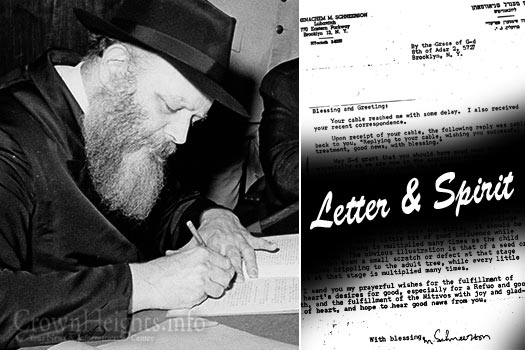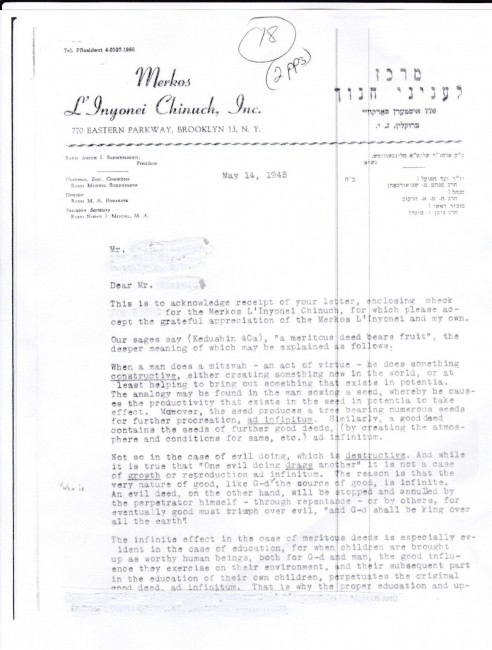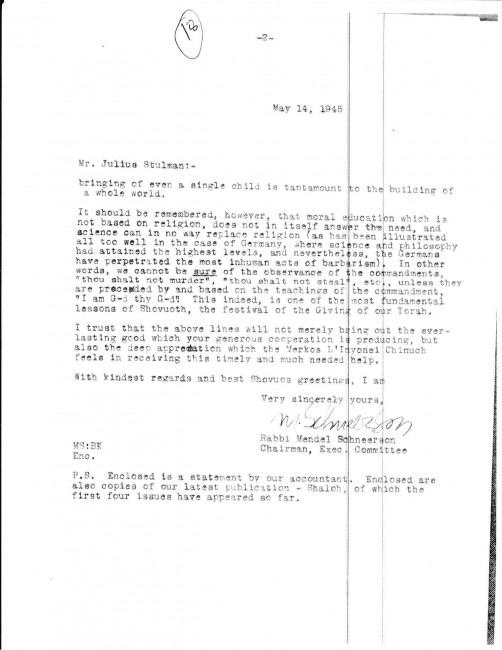
Letter & Spirit: Infinite Good Vs. Finite Evil
In this week’s edition of Letter and Spirit, we present a unique letter written by the Rebbe in 1945, while he was still known as the Ramash and was chairman of Merkos L’inyonei Chinuch. In it, the Rebbe thanks a well-known supporter for his generous contributions, and explains the difference between the infinite and unlimited effects of a good deed and the limited qualities of an evil deed, which do not have a lasting existence and are ultimately annulled. The letter was written in English through the Rebbe’s trusted secretary Rabbi Nissan Mindel, and was made available by the latter’s son-in-law, Rabbi Sholom Ber Shapiro.
In the letter, the Rebbe also speaks about the critical importance of a genuine Torah education – where moral and ethical behavior is taught on the premise of a divinely ordained commandment, and not merely left to the good will of man.
This weekly feature is made possible by a collaboration between CrownHeights.info and Nissan Mindel Publications. Once a week we publish a unique letter of the Rebbe that was written originally in the English language, as dictated by the Rebbe to Rabbi Mindel.
*********
B’H
May 14, 1945
Mr.
Brooklyn, N.Y.
Dear Mr. :
This is to acknowledge receipt of your letter, enclosing check for the M.L.Ch. , for which please accept grateful appreciation of the M.L.Ch and my own.
Our Sages say (Kedushin 40a), “a meritorious deed bears fruit,” the deeper meaning of which may be explained as follows.
When a man does a mitzvah – an act of virtue – he does something constructive, whether creating something new in the world or at least, helping to bring out something that exists in potential. The analogy may be found in the man sowing a seed, whereby he causes the productivity that exists in the seed in potentia to take effect. Moreover, the seed produces a tree bearing numerous seeds for further procreation, ad infinitum. Similarly, a good deed contains the seeds for further good deeds (by creating and atmosphere and conditions for same, etc.) ad infinitum.
Not so in the case of evil doing, which is destructive. And while it is true that “One evil doing drags another” it is not the case of growth or reproduction ad infinitum. The reason is that the very nature of good, like G-d Who is the source of good, is infinite. An evil deed, on the other hand, will be stopped and annulled by the perpetrator himself – through repentance – or by others, for eventually good must triumph over evil, ‘and G-d shall be king over all the earth!”
The infinite effect in the case of meritorious deeds is especially evident in the case of education, for when children are brought up as worthy human beings, both for G-d and man, the good influence they exercise on their environment and their subsequent part in the education of their own children, perpetuated the original good deed, ad infinitum. That is why the proper education and upbringing of even a single child is tantamount to the building of a whole world.
It should be remembered, however, that moral education which is not based on religion does not in itself answer the need and science can in no way replace religion (as has been illustrated all too well in the case of Germany, where science and philosophy had attained the highest levels and nevethelss, the Germans have perpetrated the most inhuman acts of barbarism). In other words, we cannot be sure of the observance of the commandments “thou shalt not murder”, “thou shalt not steal”, etc., unless they are preceded by and based on the teachings of the commandment, “I am G-d thy G-d”. This indeed is one of the most fundamental lessons of Shovuot, the festival of the Giving of our Torah.
I trust that the above lines will not merely bring out the everlasting good which your generous cooperation is producing but also the deep appreciation which the M.L.Ch feels in receiving this timely and much needed help.
With kindest regards and best Shovuos greetings, I am
Very truly yours,
Rabbi Mendel Schneerson
Chairman, Exec. Committee
P.S. Enclosed is a statement by our accountant. Enclosed are also copies of our latest publication – Shaloh, of which the first four issues have appeared.
**********
The above letter is from the forthcoming book Chabad in America Through the Folders of Nissan Mindel by Nissan Mindel Publications. The letters are from the archives of Rabbi Dr. Nissan Mindel, a personal secretary to the Previous Rebbe and The Rebbe, whose responsibilities included the Rebbe’s correspondence in English.
We thank Rabbi Sholom Ber Shapiro, director of Nissan Mindel Publications and the one entrusted by Rabbi Mindel, his father-in-law, with his archives, for making these letters available to the wider public. May the merit of the many stand him in good stead.
















